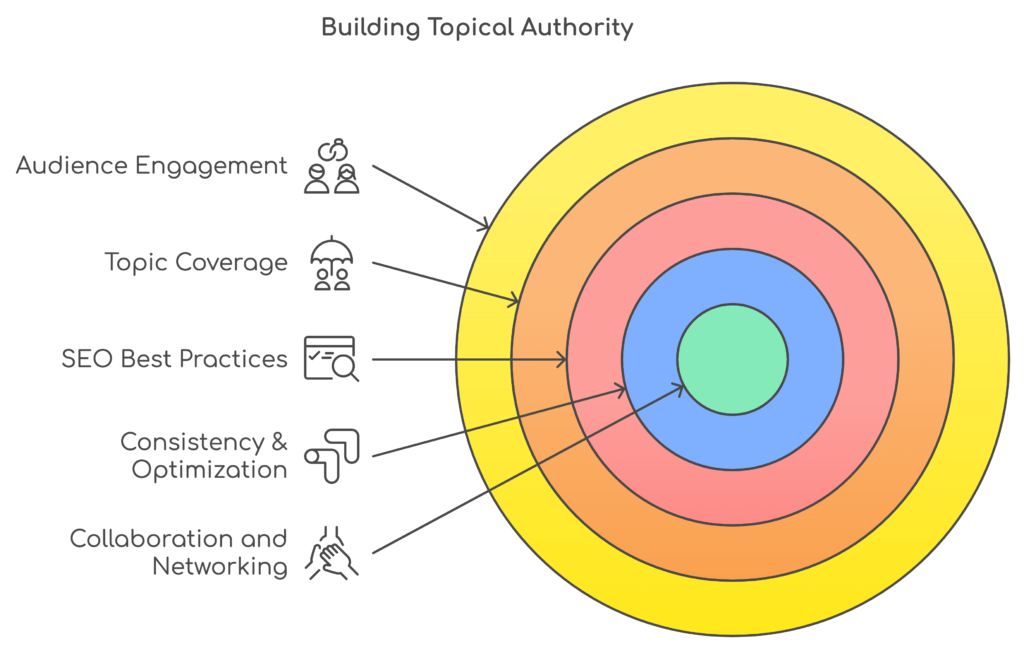Last Updated on August 30, 2025
When scouring through search results, have you ever come across a particular website that just seems to dominate the front page for a specific subject? I’ve often wondered about this myself, and it turns out that these sites have secured what’s known as topical authority. No, that’s not an ointment! Topical authority is usually acquired through hard work and is given when a search engine believes that your website has authority within the niche in which your website resides.
Moving forward, let’s look at exactly what topical authority is, what it means for your website, and why it’s so important for website owners.
Table of Contents
ToggleUnderstanding Topical Authority
Topical authority refers to the credibility and expertise a website or content creator has on a particular subject. When we consistently produce high-quality, comprehensive content on a specific topic, we become recognized as authorities in that area. This recognition doesn’t just come from the readers but also from the search engines on which the website is indexed.
Let’s start with an example. Imagine you’re passionate about organic gardening. You start a blog where you share detailed articles about soil health, pest control, plant nutrition, and seasonal planting guides. Over time, as you cover more aspects of organic gardening in-depth, your blog becomes a go-to resource for others interested in the topic. You’ve established topical authority in organic gardening.
Why Topical Authority Matters
Improving Search Engine Rankings
As our website grows, our engagements grow as well. This is when Google starts to step in: when your website’s content meets a certain criterion. When we build topical authority, search engines like Google take notice. They prioritize content from authoritative sources because they want to provide users with the best possible answers to their queries. This is known as ‘solving the searcher’s intent.’ This would now mean that our content is more likely to rank higher in search results, increasing visibility and attracting more organic traffic.
Increased Trust, Credibility, and User Engagement
Establishing ourselves as experts strengthens trust with our audience. For example, when a user searches for information on our topic, our website is consistently recommended. Readers are more likely to return to our site, share our content, and recommend us to others when they perceive us as knowledgeable and reliable. This trust is invaluable, especially if we’re offering products or services related to our content.

Online businesses thrive on engagement. Engagement is the data we often look for to signify that our reader’s needs are being met. Authoritative content tends to keep readers engaged longer. When we provide comprehensive information that answers their questions thoroughly, visitors are more likely to explore other parts of our site, subscribe to newsletters, or follow us on social media.
Gaining A Competitive Advantage
Let’s face it: the internet is becoming a bit crowded. Just typing in “how to build a chair” garners 731,000,000 results. Having topical authority sets us apart from the literal millions of competitors who may only touch on subjects superficially. By being the accepted source on a topic, we position ourselves ahead of others and attract a dedicated & loyal audience.

How to Build Topical Authority
Can we build it? Yes, we can! Building topical authority doesn’t happen overnight, but with dedication and the right approach, we can achieve it. Here’s how we recommend getting started:
We recommend honing in on a particular area where we can offer unique insights. Instead of covering broad topics, narrowing our focus allows us to target the niche more efficiently and provide more value. For example, rather than writing about “health and wellness,” we might specialize in “plant-based nutrition for athletes.”
Moving forward, we focus on creating high-quality, engaging content. Quality is paramount. We should aim to produce content that is well-researched, accurate, and offers new perspectives. This might include tutorials, case studies, expert interviews, and comprehensive guides that cover all aspects of our chosen topic. Think outside of the box. Do what your competitors have not done.

Remaining Consistent & Maintaining Optimization
Consistency is very important within SEO. Regularly publishing fresh content helps maintain our presence and keeps readers engaged. I find that creating a content calendar keeps me organized and ensures that I’m consistently contributing valuable material to my audience.
Following SEO Best Practices
While our primary focus should be on our readers, we can’t ignore SEO best practices. This means using relevant keywords naturally within our content, optimizing meta descriptions, and ensuring our site is mobile-friendly & fast-loading. All of these are key optimization concepts and should have effort put into them.
Covering The Entire Topic in an Easy-to-Follow Structure
This should go without saying, but I can’t stress this enough. To become an authority on a particular topic, you must cover different aspects of it to the point you answer most of your users’ questions.
Silo is a site structure that is easy for Google to follow and understand, and is pretty easy to build and build on.
Engaging Our Audience
Building relationships with readers enhances our overall authority. By responding to comments, participating in discussions, and soliciting feedback, we show that we’re approachable & invested in our community.
We recommend monitoring your engagement metrics on all website posts and pages and on social media accounts and posts. Analyzing this data will help us better understand what content our readers have engaged with the most.
Collaboration, Networking, & Frequent Updates
Connecting with other experts in our field can boost our credibility & engagement. We might guest post on reputable sites, participate in webinars, or collaborate on projects. These activities not only expand our reach but also associate us with other respected voices.
Our fields are always evolving, and so should we. Staying updated with the latest trends, research, and developments ensures that our content remains relevant. I make it a habit to revisit and update older posts to reflect new information.
My Personal Experience: The Writer’s Perspective
When I first started writing about digital marketing, I covered a wide range of topics but didn’t see much engagement. It wasn’t until I focused specifically on content strategy and dove deep into that niche that I began to build an audience. By sharing detailed guides, personal case studies, and practical tips, I established myself as a trusted resource. The connections I’ve made and the opportunities that have arisen since then have been incredibly rewarding.
Key Takeaways
Building topical authority requires commitment, but the benefits are well worth the effort. By focusing on providing genuine value, staying authentic, and continuously learning, we not only enhance our online presence but also make a meaningful impact on our readers.
Readers will think of your business and your website whenever they ask questions about your website’s subject matter.
Moving forward, let’s take what we’ve learned here and strive to become the authoritative voices our audiences can rely on. After all, sharing knowledge and helping others is at the heart of what we do.